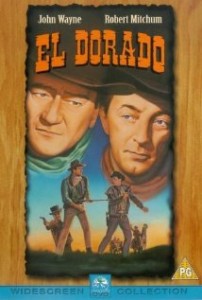Tonight at dinner, my husband, two daughters and I had our first conversation about…boys. They had curled up with daddy on the couch Sunday to watch a western with John Wayne, and for the first time, they were smitten with one of the young gunslingers. It didn’t seem to matter when I reminded them that an actor who’d been 30 years old during filming would now be about 80 and walking with a cane. I still caught them oohing and ahhing over him later that night.
There is, of course, nothing wrong with appreciating God’s handiwork. But their response, even without being clued in to what marriage fully entails, was not something I felt comfortable with. Mainly because their appreciation of the young man wasn’t selfless or impersonal–rather, they saw him as a means to their own gratification. I expect it was quite a lot like I viewed my dates back in college: as some sort of adornment to hang on their arm and give them new significance. Or perhaps simply someone they’d like to worshiped by. And it made me sad.
I feel quite sure that a lot of their mooning over this fellow came from the reading my oldest has been doing. She recently read Anne of Green Gables and quite a few other fairly innocuous, but secular, stories involving romance, but they seem to have struck a chord. And while I’m not going to toss out all her books, it was time for a conversation. Time for a discussion around the table as to why those feelings–those childish ways of talking about the opposite sex–aren’t good for us and distort the wholesome friendships girls and boys ought to have until they’re ready for marriage.


![]()
![]()
Take Away Points
I have to admit, this conversation really got me thinking. Here are some take away points that are either drawn from the conversation, or that came to me as I thought back over what we’d discussed.
- A book’s virtue involves the virtue of the characters. Characters don’t have to be perfect to embody virtue, but they need to show some shame for wrong or taste for the good. Discussion Opportunity: Next time you watch a film or read a book with your child, ask her to weigh some of her favorite characters in terms of virtue. Do they seek the good? Do they feel shame when they don’t measure up? Are there any characters who remind you of Christ?
- A book’s virtue involves the morality of the world within which the characters exist. A book doesn’t have to have a perfect hero–or even a redeemable one to be virtuous. Dostoevsky’s Crime and Punishment is an excellent example of a book with an evil protagonist that retains a moral vision. On the flip side of that, a book with a virtuous hero isn’t necessarily a wholesome read. For instance, 50 Shades has a largely innocent heroine who struggles to do the right thing, but the context of her struggles is so demeaning that the book is not virtuous reading. Discussion Opportunity: Ask your child to describe a book he is reading in school. Talk about how the author created the world–is it similar to real life? Is it fantastic? Does it happen in a really scary place or with supernatural events/characters? Then ask him to weigh whether that world reflects a Christian worldview? Think about how the book might influence a kid who wasn’t grounded in Scripture.
- A book’s virtue is informed by the worldview of the time and place. Books from other cultures and time periods are often useful for helping readers see beyond their narrow cultural context.
- A book’s virtue must be weighed by Scripture. Culture so often swings from one excess to another, with what is virtuous today seeming out of fashion tomorrow. (Just ask the cast of Leave it to Beaver.) Only God’s Word can give us timeless principles to see beyond our own prejudices and judge rightly.
- A book’s virtue is always accepted or rejected by a reader’s heart. As our culture rejects God’s Word, loving parents are going to have to work ever harder to bless their children with virtuous books. But that alone isn’t enough. The human heart will always find ways of perverting the good. Readers need the Holy Spirit’s guidance and adults to come along side them to offer spiritual insight into how to read. We need The Interpreter to help us see what characters truly long for and how God has appointed means to meet those longings. And ultimately, we need spiritual eyes to see that all the other longings we have–for food, shelter, love, etc–point to the highest longing of our heart, God. Without him, even the best of romantic love stories is a vain, empty thing. Discussion Opportunity: Ask your child to tell you about the desires and longings of a main character in a movie or book he likes. In other words, what is it that the character thinks he needs to make him happy? Is it new parents? A new bike? Or maybe he needs to save the world from a looming apocalypse? Then help him connect those things to Christ–do they point to our ultimate joy or security in God?
Join the Discussion!
We’ve covered a lot of ground on how to think about romance in stories for teens. But I’ll admit, I have a lot more practice analyzing stories than raising kids. Do you have any suggestions for young moms like me who want to instill their children with a high regard for marriage and virtuous romance? Any books/movies you particularly love? Or just some practical advice on how to help elevate children’s minds when it comes to romance?
Here is one response I got on Facebook yesterday from Lisa for how I can encourage my girls:
Tell your girls about your husband’s character qualities that attracted you to him and KEEP you attracted after all these years, and tell them looks were part of the original equation, but not the main thing. Remind them that everyone will eventually age and lose their looks, but character lasts.
Any advice you could add to the conversation?
Further Resources
We’ve been talking about romance and sexual integrity a lot this spring. For further reading and listening, please check out Janie’s Roe v. Wade related reviews, as well as Emily’s interview with Moody literature professor Dr. Rosalie De Rosset on her book, Unseduced and Unshaken.
Stay Up to Date!
Get the information you need to make wise choices about books for your children and teens.
Our weekly newsletter includes our latest reviews, related links from around the web, a featured book list, book trivia, and more. We never sell your information. You may unsubscribe at any time.
Support our writers and help keep Redeemed Reader ad-free by joining the Redeemed Reader Fellowship.
Stay Up to Date!
Get the information you need to make wise choices about books for your children and teens.
Our weekly newsletter includes our latest reviews, related links from around the web, a featured book list, book trivia, and more. We never sell your information. You may unsubscribe at any time.
FREE Bible Guide!
Get a guide to the Best Bibles for Children and Teens. Perfect for an Easter gift.
We'd love to hear from you!
Our comments are now limited to our members (both Silver and Golden Key). Members, you just need to log in with your normal log-in credentials!
Not a member yet? You can join the Silver Key ($2.99/month) for a free 2-week trial. Cancel at any time. Find out more about membership here.
5 Comments
Leave a Comment
You must be logged in to post a comment.



Emily, thank you so much for the opportunity to do that! It was great fun!
May I throw in my two cents about the issue of fictional crushes? (I almost said, play devil’s advocate. 🙂 ) My own personal opinion is that these feelings are natural and not necessarily unethical or selfish. Developing an appreciation for the opposite sex is part of the way we’re made, after all. So when we experience these attractions, I don’t believe they always need to be uprooted, only kept in perspective. They can help us explore what we really want to look for in the opposite sex, and what we consider good and desirable qualities.
As I said, just my humble opinion!
I think I’m with Gina on this one. My first movie crush was (okay, this dates me) Charlton Heston, in El Cid. At the age of 11, I didn’t fully realize what a manly man he was, but there was a definite appeal! Jonathan Edwards wrote about how strongly the sexes attract each other, and we should hope that the men our daughters marry would appeal to them physically as well as spiritually. Of course it can get out of hand, and any discussion of a boy shouldn’t dwell on his hotness, but we can appreciate an attractive person because of Who made him.
Sounds like we need another podcast, guys! : ) I expect my original intent must not have come across in my sleep-deprived haze since I don’t disagree with either of you. I think the issue isn’t whether its ok to have those feelings of admiration, but what is the appropriate way to think about them before God and express them to other people. And that’s why I appreciated Lisa’s advice, as well as our podcast so much, since it helped me think about what makes romance virtuous. But keep your thoughts coming!
Thanks, Ladies! This was a great conversation to listen in on. I am finding the same caution with today’s teen girl lit and am happy to be reminded of good story to share as a counterpoint to that message which is so subtle and problematic. A quick thought on Downton and Mary’s life post Mr. Pamuk, I found Lord Grantham and Matthew’s forgiveness of her actions to be such a strong example of godly mercy and manly leadership. Both scenes were so beautiful in that individually these men offered Mary a larger story of redemption and thereby, a way out of another poor choice. Again, thanks!
So glad you found our podcast worthwhile, Katrina. And thanks for adding your thoughts about Downtown. There seems to be so much interest and fodder for discussion that I wonder if we shouldn’t have done a podcast just on it!